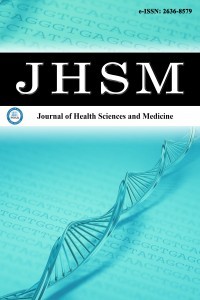The perception and attitude of Turkish ophthalmologists related to the COVID-19 pandemic
Attitude, COVID-19, ophthalmologists, pandemic, perception
The perception and attitude of Turkish ophthalmologists related to the COVID-19 pandemic
Attitude, COVID-19, ophthalmologists, pandemic, perception,
___
- Zhu N, Zhang D, Wang W, et al. A Novel Coronavirus from Patients with Pneumonia in China. N Engl J Med. 2020; 382: 727-33.
- Lin C-F. COVID-19 and the Institutional Resilience of the IHR (2005): Time for a Dispute Settlement Redesign? Contemp Asia Arb J 2020; 13: 269.
- Anderson RM, Heesterbeek H, Klinkenberg D, Hollingsworth TD. How will country-based mitigation measures influence the course of the COVID-19 epidemic? The Lancet 2020; 395: 931-4.
- Chang D, Xu H, Rebaza A, Sharma L, Dela Cruz CS. Protecting health-care workers from subclinical coronavirus infection. Lancet Respir Med 2020; 8: e13.
- Kuo IC, O'Brien TP. COVID-19 and ophthalmology: an underappreciated occupational hazard. Infect Control Hosp Epidemiol 2020; 41: 1207-8.
- Geniş B, Gürhan N, Koç M, et al. Development of perception and attitude scales related with COVID-19 pandemia. Pearson J Soc Sci Human 2020; 5: 306-28.
- Zhong Y, Liu W, Lee T-Y, Zhao H, Ji J. Risk perception, knowledge, information sources and emotional states among COVID-19 patients in Wuhan, China. Nurs Outlook 2021; 69:13-21.
- Albott CS, Wozniak JR, McGlinch BP, Wall MH, Gold BS, Vinogradov S. Battle buddies: Rapid deployment of a psychological resilience intervention for health care workers during the coronavirus disease 2019 pandemic. Anesth and Analg 2020; 131: 43-54.
- Georgiou N, Delfabbro P, Balzan R. Conspiracy beliefs in the general population: The importance of psychopathology, cognitive style and educational attainment. Pers Individ Dif 2019; 151: 109521.
- Georgiou N, Delfabbro P, Balzan R. COVID-19-related conspiracy beliefs and their relationship with perceived stress and pre-existing conspiracy beliefs. Pers Individ Dif 2020; 166: 110201.
- Fattorini D, Regoli F. Role of the chronic air pollution levels in the Covid-19 outbreak risk in Italy. Environ Pollut 2020; 264: 114732.
- Wang P, Chen K, Zhu S, Wang P, Zhang H. Severe air pollution events not avoided by reduced anthropogenic activities during COVID-19 outbreak. Resour Conserv Recycl 2020; 158: 104814.
- Saadat S, Rawtani D, Hussain CM. Environmental perspective of COVID-19. Sci Total Environ 2020; 728: 138870.
- Kowalczyk O, Roszkowski K, Montane X, Pawliszak W, Tylkowski B, Bajek A. Religion and Faith Perception in a Pandemic of COVID-19. J Relig Health. 2020; 59: 2671-7.
- Naro W, Abubakar A, Syatar A, Amiruddin MM, Pallawagau B. Have Attitudes towards Religiousness Shifted Due Covid 19 Outbreak? Evidence from Moslem Generations in Makassar-Indonesia. PalArch's J Archaeol Egypt/ Egyptol 2021; 18: 322-34.
- Li J-B, Yang A, Dou K, Wang L-X, Zhang M-C, Lin X-Q. Chinese public’s knowledge, perceived severity, and perceived controllability of COVID-19 and their associations with emotional and behavioural reactions, social participation, and precautionary behaviour: A national survey. BMC Public Health 2020; 20: 1-14.
- Yıldırım M, Özaslan A. Worry, severity, controllability, and preventive behaviours of COVID-19 and their associations with mental health of Turkish healthcare workers working at a pandemic hospital. Int J Ment Health Addict 2021:1-15.
- Sobkow A, Zaleskiewicz T, Petrova D, Garcia-Retamero R, Traczyk J. Worry, Risk Perception, and Controllability Predict Intentions Toward COVID-19 Preventive Behaviors. Front Psychol 2020; 11: 582720.
- Elbay RY, Kurtulmuş A, Arpacıoğlu S, Karadere E. Depression, anxiety, stress levels of physicians and associated factors in Covid-19 pandemics. Psychiatry Res 2020; 290: 113130
- Dodd RH, Cvejic E, Bonner C, Pickles K, McCaffery KJ, Sydney Health Literacy Lab C-g. Willingness to vaccinate against COVID-19 in Australia. Lancet Infect Dis 2021; 21: 318-9.
- Kourlaba G, Kourkouni E, Maistreli S, et al. Willingness of Greek general population to get a COVID-19 vaccine. Glob Health Res Policy 2021; 6: 3.
- Yurttas B, Poyraz BC, Sut N, et al. Willingness to get the COVID-19 vaccine among patients with rheumatic diseases, healthcare workers and general population in Turkey: a web-based survey. Rheumatol Int 2021;41: 1105-14.
- Montano DE, Kasprzyk D. Theory of reasoned action, theory of planned behavior, and the integrated behavioral model. Heal Behav Heal Educ, Res Pract 2015; 70: 231.
- Yayın Aralığı: Yılda 6 Sayı
- Başlangıç: 2018
- Yayıncı: MediHealth Academy Yayıncılık
The impact of SGLT2-inhibitor therapy on platelet function in type 2 Diabetes mellitus
Pınar AKHANLI, Sema HEPŞEN, Muhammed KİZİLGUL, Sevgi BİLEN AYHAN, Hakan DÜĞER, Hayri BOSTAN, Muhammed Erkam SENCAR, Bekir UCAN, Erman ÇAKAL
Burak BAYRAKTAR, Cüneyt Eftal TANER
Kezban ÖZÇELİK KAYNAK, Barış ÖZTUNA
Regulatory immune cells: a review of the novel paradigm of primary Sjogren's syndrome
Jülide SAYİN KART, Ummahan DALKİLİNC HOKENEK
Burak BAYRAKTAR, Cüneyt Eftal TANER
Treatment of distal femur fractures with retrograde intramedullary nailing utilizing a tibial nail
Yılmaz ERGİŞİ, Mesut TIKMAN, Selçuk KORKMAZER, Ozan ALTUN, Halil KEKEÇ, Erdi ÖZDEMİR, Uygar DAŞAR
